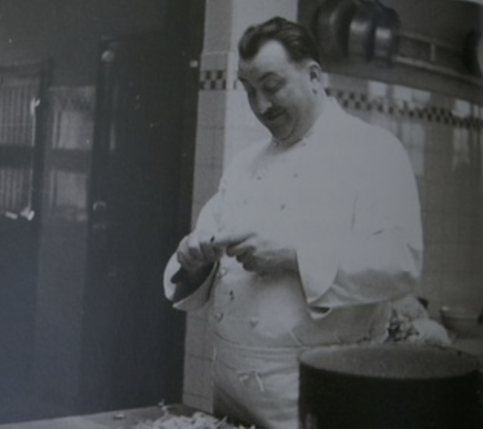|
In my second year at the Stratford Chef School, I was assigned as student executive chef for a dinner honouring the great French chef Fernand Point. The dinner was on the last night of classes before the Christmas holiday. On the surface, the menu appeared simple, but its execution required skill and subtlety. I was a perfectionist and hell-bent on achieving Michelin three-star results in a teaching kitchen in rural southwestern Ontario, no matter the strain. I’d fallen hard for Point while doing my research and, crazy as it seems, of all the people I needed to please on that night, I most wanted to get it right for him.
Point steered the course of French cuisine toward the future at his restaurant, La Pyramide, in Vienne, France, moving it away from its often overwrought classical past and toward a sophisticated, lighter approach still recognizable today. He worshipped ingredients and thought they should shine. Flavourful reductions began to simmer alongside the flour-thickened sauces of the past. Elaborate menus were scaled back. Most of the three-star chefs who would later create Nouvelle Cuisine were apprentices in his kitchen—Bocuse, Chapel, and the Troisgros brothers. They were carriers of his lessons and loved him, as did his peers. I’d been in the kitchen until late the night before the dinner, working with the student assigned to pastry. The dessert for the evening was Gâteau Succès. We were busy piping rounds of almond meringue and slow baking them to a crisp finish, whipping buttercream to a light fluff the colour of fatty cream and flavouring it with crushed praline. The success of our pastry prep left me feeling in control and entertaining gilded dreams of the dinner. A bliss that would be short-lived as, the next day, one small detail went astray. The evening’s main course was one of Points most famous creations, Poularde en Vessie, chicken cooked with aromatics in a pig’s bladder. The bladders were the final item to be struck off my prep list and were essential to reproducing the dish with accuracy. I’d written into the evening’s script a grand parade through the dining room of a just-cooked and fully inflated bladder set on a silver tray, just like the pictures I’d seen in historical cookbooks. I’d ordered the bladders from the local European butcher well in advance, and they seemed pleased to fill my unusual request. Before heading to the restaurant in the early afternoon of the dinner, my last stop was to collect them. Mr Weideman and his son Daniel presented me with a long strand of bladders, blown up like balloons, and strung together like something out of a Hieronymus Bosch painting. The holiday riot of their delicatessen lost its coloured-foil lustre as I instantly realized they were too small. I’d had to paste a smile on my face big enough to conceal my disappointment. With bulging shopping bags in each hand, I headed out into wet, heavy snow that clung to my boots with the weight of the failure stuck in my head. The stainless steel sky tinged the town the colour of my despair. My mind was racing to find a solution to a problem that had come on like the flu. The kitchen was empty when I arrived at the restaurant. I’d planned time to review my orders before the day’s activity began. By nature, I am tightly wound, but my nerves clanged like sauté pans heaved into the dish pit during service on that afternoon. I took pride in being fastidious and yet one of the details I’d attended to with such care had gotten away. I couldn’t think what to do about the bladders and settled on hand-wringing. When the teaching chef arrived, he could read the distress on my face. We set the crew to work, and the chopping and hustle calmed me. The chicken would be cooked for dinner service, so we had the luxury of a few free hours. Out of the blue, the chef wondered aloud if Ziploc bags could substitute for the bladders. We had enough time and ingredients for a trial run. I put a large stockpot of water on to boil while someone ran off to the store to buy the bags. We needed this solution because we didn’t know that pig’s bladders vary in size and shape. The bladders I received could accommodate a small bird like squab or pheasant but certainly not a chicken. The bag containing the chicken, liquor, and aromatics stayed suspended in the barely simmering water bath. The ethereal scent of the bird when it emerged from the bag shattered my worry—it was succulent with the flavours of cognac, Madeira, and black truffle. In late December of 1991, long before the advent of modernist cuisine, we had invented a primitive form of sous-vide cooking. The Ziploc intervention worked a charm. We all exhaled, and the rest of the night’s prep was done with ease. The first course, gratin de queues d’écrevisses, was a luxurious dish of langoustines in a shellfish reduction, rich with cream. It took Point seven years to perfect this dish. The chicken was garnished with glazed baby root vegetables from a local farmer. Saint Marcellin cheese followed, wrapped like a gift from nature in chestnut leaves, perfectly ripe and earthy. With cheeks flushed from the heat of the kitchen, I was giddy with the success of the evening as the last dessert left the kitchen. Something important had happened to me. On that winter night, in the tender, early days of my development, I had fallen truly and deeply in love with French cooking. I spent the next decade pursuing its masters. As I passed through the dining room greeting the guests, several told me that Fernand Point was smiling down on me. I recognized the compliment as a generous offering to a young cook, but I also knew in my heart, having passed the test of recreating the work of a great master, it was true. Comments are closed.
|
Archives
May 2021
© Deborah Reid, 2012 - 2024. All Rights Reserved. Categories
All
|

